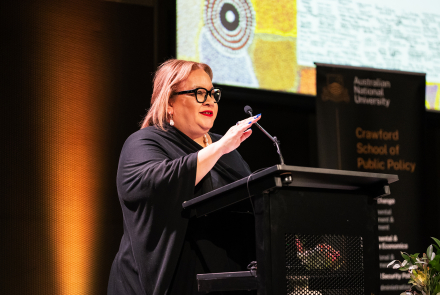
Truth after the Voice – addressing First Nations public policy
Myths around Indigenous peoples and First Nations public policy are now considered as facts. This is the real aftermath of Australia voting NO to an Indigenous Voice to Parliament in the 2023 national referendum.
This is a key issue raised by Scientia Professor Megan Davis, in the inaugural First Nations Women in Public Policy Lecture, organised and hosted by the ANU Crawford School of Public Policy, part of the ANU College of Asia and the Pacific. Prof Davis has a significant history with the College as she studied for her PhD at the School of Regulation and Global Governance.
During her oration, Professor Davis said both misinformation and disinformation distorted and obscured the fundamental message of the Voice to Parliament and opened the door for the NO vote to mean NO for any Indigenous policy change.
These issues highlighted by Professor Davis raise significant questions about the future direction of Indigenous representation and reconciliation efforts. For many acclaimed academic experts at the ANU College of Asia and the Pacific, there is a need to explore the institution’s role in addressing these unresolved issues.
“Public policy never ends. It is an ongoing practice. For our College, it is important to answer persistent questions around public policy and Indigenous affairs after the Voice,” Dean of the College, Professor Helen Sullivan said.
Through our Crawford School of Public Policy, the College provides leading expertise in public policy research around diverse areas, including Indigenous affairs, climate change, governance, and economic development. Professor Janine O’Flynn, Crawford School of Public Policy Director says,
“Sometimes these conversations are challenging and uncomfortable, but we need to have them. Our school plays a key role in bringing people together to grapple with and address the full range of complex policy challenges that confront us.”.
Associate Professor Siobhan McDonnell commended the Crawford School of Public Policy for organising the lecture and said it was encouraging to see more debate and Indigenous engagement at the ANU.
“This lecture is important because Australia voted no to addressing issues around Indigenous rights through the Voice. We need to come together to find alternative solutions,” she said.
“The conversation didn't end the day after the referendum,” Professor Sullivan reiterated.
“At this College, we bring together First Nations academics, students, and colleagues from all over the region. It is a welcoming space for intellectual discussion, a safe space where knowledge is cultivated, and Indigenous perspectives are respected,” she said.
Where to from here? Professor Davis suggested the next step post-the-Voice is to have yarns with Australian communities about what went wrong during the campaign and address a sense of belonging. One positive she sees from the Voice to Parliament referendum is “We have 6 million friends we didn't know that we had. That is a marvelous foundation to do our work.”
“From the ashes of the referendum, we now find ourselves in a movement for change,” she concluded.
Click here to learn more about our public policy work and our commitment to supporting Indigenous voices and perspectives.
Updated: 16 August 2024/Responsible Officer: Crawford Engagement/Page Contact: CAP Web Team











